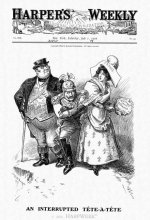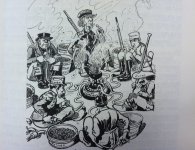The first Moroccan Crisis in 1905, which was largely caused by the German government (although not necessarily the Kaiser), was one of the important causes that led to World War I in that it caused a great deal of mistrust. Germany felt that it could not stand by and let the French have a free hand in Morocco. Moreover, since the Entente Cordiale between England and France had only been signed been in 1904, the German government used the crisis to drive a wedge between England and France, with the hope that it would fracture the agreement and France would have no choice but to make an alliance with Germany and England would be isolated. Germany also hoped that the US would take their side and that they could get Japan to split from England and join their alliance with Austria-Hungar. In the end, Germany didn't get much at the 1906 Conference.
Below are a couple of cartoons regarding the Crisis.
In the first one, from Harpers Weekly, Germany (possibly the Kaiser), who was not happy with the Entente Cordiale, is shown as trying to drive a wedge between John Bull and Marianne over the issue of Morocco.
View attachment 144889
In the second one, the powers appear to be sitting peacefully around the "peace pipe," which represents the conference at Algeciras, Spain to settle the Crisis. However, if you look closer, they have guns on hand and bowls of explosives. The rivals France and Germany sit next to each other while England looks disapprovingly at Germany. Spain and Italy are waiting and Uncle Sam looks none too happy.
View attachment 144888
Brad



